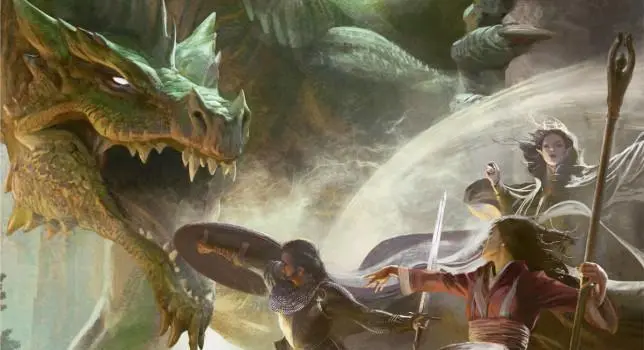Dungeons and Dragons is one of those ur-pillars of geekdom, like classic Doctor Who or original flavor Star Trek, which everyone associates with being a geek. Unfortunately, like classic Who and its incredible backlog of seasons, D&D‘s steep learning curve can be discouraging for new players. Unless constantly crunching numbers and memorizing several pages of grappling rules is your idea of a good time (in which case, congrats), the complexity of previous D&D editions can be a little overwhelming at first. Not anymore.
The great news is that the newly released 5th edition of the Player’s Handbook (or NEXT, as it was known in testing) has made huge strides in simplifying not only character creation but also gameplay. The basics are all still there—you’ve got your attack dice for dealing damage and your d20 for basically everything else; your Armor Class still determines whether or not you take a hit—but many other components have been replaced with the new advantage/disadvantage system.
This system makes calculating successes or failures much easier for the players and Dungeon Master. Instead of elves having a racial bonus to saving throws against charms, for example (in layman’s terms, being less likely to be affected by magic), the bonus disappears and elves instead have an advantage against charms. When a player has an advantage or a disadvantage, instead of rolling a d20 and adding various modifiers, they roll two d20s and pick either the higher or lower roll, respectively: less math, less complexity, more play time.
The new edition has also built in a new Backgrounds library which encourages players to develop histories and personalities for their characters, instead of focusing only on min/maxing stats. By choosing a background—Soldier, Folk Hero, Acolyte, Criminal, and more—you will not only develop a more interesting character for the role-playing portions of your sessions, but you can also gain bonus equipment, extra languages, and additional proficiency modifiers. In other words, by thinking more about who your character is as a person (their personality, flaws, wants, and ideals) you can better customize their strengths and weaknesses for gameplay.
Inspiration is a related mechanic, similar to Pathfinder‘s Hero Points. If the DM feels you’re making gameplay choices in keeping with your character’s personality and background, she may gift you with Inspiration. Inspiration can be spent to offset disadvantages or gain advantages on rolls. This again encourages developing interesting characters and performing creative story actions by rewarding them with in-game boons.
If nothing in the above paragraphs made any sense to you, you may be new to Dungeons & Dragons, Pathfinder, or tabletop role-playing games in general. Here’s the gist of what 5th Edition means for you: if you’ve wanted to play D&D but were too nervous or confused, now is the perfect time to try it. Not only is this new edition much simpler than previous versions, it’s brand new. Core Rulebooks and Starter Sets have only been on the shelves for a few weeks—even the most experienced players will still be getting used to the new system.
Wizards of the Coast is also beginning a new D&D Encounters series running on NEXT, which will allow new and old players alike to join regular campaigns in their local area. Whether you’re brand new to tabletop, have a little role-playing experience, or are a Dungeons & Dragons veteran, Encounters will let you make new friends and gain practice on the new edition. Definitely run, don’t walk, to your local game store and get in on whatever 5th Edition action they’re registered to throw down.
And remember: the most important rule of tabletop is you should be having fun!
Alana is a professional writer, editor, and all-around word geek. She is beginning work on her first full-length fantasy novel and would appreciate any and all support.










Published: Sep 2, 2014 06:30 pm